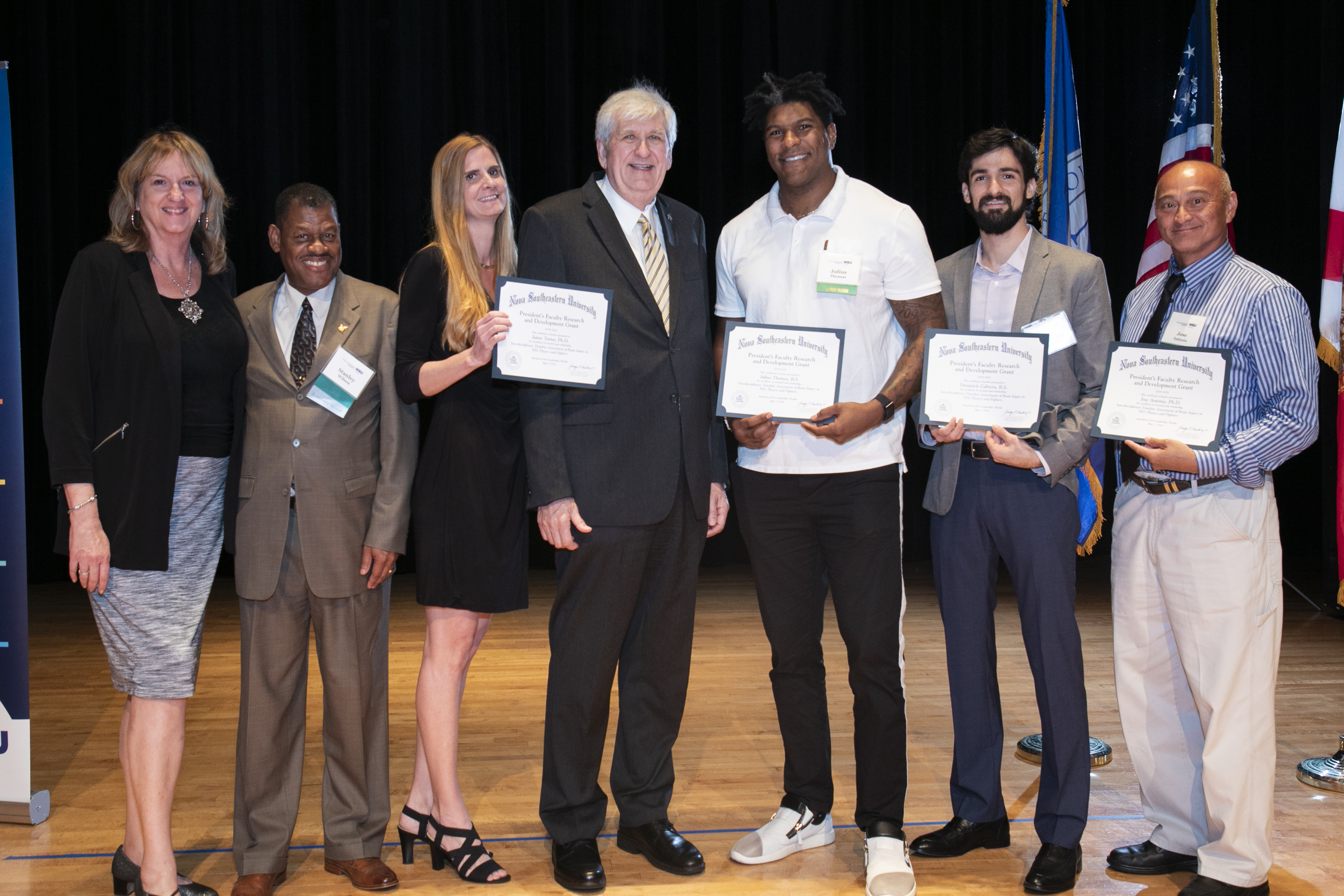Interdisciplinary Timeline Assessment of Brain Injury in NFL Players and Fighters
Grant Winners
- Jaime Tartar, Ph.D. – College of Psychology
- Corey Peacock, Ph.D. – College of Health Care Sciences
- Jose Antonio, Ph.D. – College of Health Care Sciences
- Julius Thomas, BS – College of Psychology
- Dominick Cabrera, BS – College of Psychology
- Dr. Ross Zafonte – Harvard Medical School
Deans
- Karen Grosby, Ed.D. – College of Pharmacy
- Harold Laubach, Ph.D. – College of Medical Sciences
Abstract
 Chronic traumatic encephalopathy (CTE) is a degenerative brain disease that is clinically similar to Alzheimer's disease. CTE is caused by repetitive head impacts (concussive and sub-concussive) and is typically found in contact sport athletes, military veterans, and victims of domestic abuse. Participation in contact sports is particularly risky for the development of CTE. In fact, a recent autopsy examination of the brains of former football players found evidence of CTE in 21% of former high school football players, 64% of semi-professional football players, 88% of Canadian Football League players, and 99% of former NFL players. Research on CTE represents a relatively new field, and consequently, a clear pathway from head injury to disease has yet to be clearly delineated. The current proposal will directly address this gap through two main objectives. In Aim 1 we propose to discover the role that two major contributing factors (depression and obesity) play in brain health in contact sport athletes. In Aim 2 we will uncover the timing/development of neurological impairment in contact sport athletes and test for possible differences between two major contact sports - NFL players and boxers/MMA fighters ("fighters"). This study is the first of its kind to look at the timing of the development of behavioral (cognitive, emotion), biomarker (CCL11, tTau, NF-L), and body composition measures in contact sports- from active playing to post-retirement. In addition, and novel to our study, our analyses will consider several variables that previous research suggests are critical to understanding the risk for neurological impairment after injury. However, these variables have yet to be formerly analyzed in
Chronic traumatic encephalopathy (CTE) is a degenerative brain disease that is clinically similar to Alzheimer's disease. CTE is caused by repetitive head impacts (concussive and sub-concussive) and is typically found in contact sport athletes, military veterans, and victims of domestic abuse. Participation in contact sports is particularly risky for the development of CTE. In fact, a recent autopsy examination of the brains of former football players found evidence of CTE in 21% of former high school football players, 64% of semi-professional football players, 88% of Canadian Football League players, and 99% of former NFL players. Research on CTE represents a relatively new field, and consequently, a clear pathway from head injury to disease has yet to be clearly delineated. The current proposal will directly address this gap through two main objectives. In Aim 1 we propose to discover the role that two major contributing factors (depression and obesity) play in brain health in contact sport athletes. In Aim 2 we will uncover the timing/development of neurological impairment in contact sport athletes and test for possible differences between two major contact sports - NFL players and boxers/MMA fighters ("fighters"). This study is the first of its kind to look at the timing of the development of behavioral (cognitive, emotion), biomarker (CCL11, tTau, NF-L), and body composition measures in contact sports- from active playing to post-retirement. In addition, and novel to our study, our analyses will consider several variables that previous research suggests are critical to understanding the risk for neurological impairment after injury. However, these variables have yet to be formerly analyzed in a study of contact sport athletes. In particular, we will test the role that emotion, and depressive symptoms in particular, play in the development of neurologic impairment. We will also investigate the contribution that abdominal body fat plays in brain health in contact sport athletes. Abdominal obesity is not only related to the development of neurological degenerative disorders, but also a general decrease in cortical thickness due to brain atrophy.
The current proposal represents a new avenue of research for NSU and advances our research collaboration with the Harvard Players Health Study though collaboration with our study consultant, Dr. Ross Zafonte (see attached letter of support).